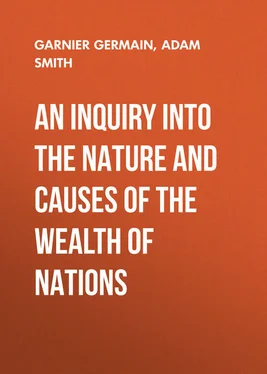Germain Garnier - An Inquiry Into the Nature and Causes of the Wealth of Nations
Здесь есть возможность читать онлайн «Germain Garnier - An Inquiry Into the Nature and Causes of the Wealth of Nations» — ознакомительный отрывок электронной книги совершенно бесплатно, а после прочтения отрывка купить полную версию. В некоторых случаях можно слушать аудио, скачать через торрент в формате fb2 и присутствует краткое содержание. Жанр: economics, foreign_antique, foreign_prose, foreign_business, на английском языке. Описание произведения, (предисловие) а так же отзывы посетителей доступны на портале библиотеки ЛибКат.
- Название:An Inquiry Into the Nature and Causes of the Wealth of Nations
- Автор:
- Жанр:
- Год:неизвестен
- ISBN:нет данных
- Рейтинг книги:5 / 5. Голосов: 1
-
Избранное:Добавить в избранное
- Отзывы:
-
Ваша оценка:
- 100
- 1
- 2
- 3
- 4
- 5
An Inquiry Into the Nature and Causes of the Wealth of Nations: краткое содержание, описание и аннотация
Предлагаем к чтению аннотацию, описание, краткое содержание или предисловие (зависит от того, что написал сам автор книги «An Inquiry Into the Nature and Causes of the Wealth of Nations»). Если вы не нашли необходимую информацию о книге — напишите в комментариях, мы постараемся отыскать её.
An Inquiry Into the Nature and Causes of the Wealth of Nations — читать онлайн ознакомительный отрывок
Ниже представлен текст книги, разбитый по страницам. Система сохранения места последней прочитанной страницы, позволяет с удобством читать онлайн бесплатно книгу «An Inquiry Into the Nature and Causes of the Wealth of Nations», без необходимости каждый раз заново искать на чём Вы остановились. Поставьте закладку, и сможете в любой момент перейти на страницу, на которой закончили чтение.
Интервал:
Закладка:
The second event was the bounty upon the exportation of corn, granted in 1688. The bounty, it has been thought by many people, by encouraging tillage, may, in a long course of years, have occasioned a greater abundance, and, consequently, a greater cheapness of corn in the home market, than what would otherwise have taken place there. How far the bounty could produce this effect at any time I shall examine hereafter: I shall only observe at present, that between 1688 and 1700, it had not time to produce any such effect. During this short period, its only effect must have been, by encouraging the exportation of the surplus produce of every year, and thereby hindering the abundance of one year from compensating the scarcity of another, to raise the price in the home market. The scarcity which prevailed in England, from 1693 to 1699, both inclusive, though no doubt principally owing to the badness of the seasons, and, therefore, extending through a considerable part of Europe, must have been somewhat enhanced by the bounty. In 1699, accordingly, the further exportation of corn was prohibited for nine months.
There was a third event which occurred in the course of the same period, and which, though it could not occasion any scarcity of corn, nor, perhaps, any augmentation in the real quantity of silver which was usually paid for it, must necessarily have occasioned some augmentation in the nominal sum. This event was the great debasement of the silver coin, by clipping and wearing. This evil had begun in the reign of Charles II. and had gone on continually increasing till 1695; at which time, as we may learn from Mr Lowndes, the current silver coin was, at an average, near five-and-twenty per cent. below its standard value. But the nominal sum which constitutes the market price of every commodity is necessarily regulated, not so much by the quantity of silver, which, according to the standard, ought to be contained in it, as by that which, it is found by experience, actually is contained in it. This nominal sum, therefore, is necessarily higher when the coin is much debased by clipping and wearing, than when near to its standard value.
In the course of the present century, the silver coin has not at any time been more below its standard weight than it is at present. But though very much defaced, its value has been kept up by that of the gold coin, for which it is exchanged. For though, before the late recoinage, the gold coin was a good deal defaced too, it was less so than the silver. In 1695, on the contrary, the value of the silver coin was not kept up by the gold coin; a guinea then commonly exchanging for thirty shillings of the worn and clipt silver. Before the late recoinage of the gold, the price of silver bullion was seldom higher than five shillings and sevenpence an ounce, which is but fivepence above the mint price. But in 1695, the common price of silver bullion was six shillings and fivepence an ounce, 17 17 Lowndes's Essay on the Silver Coin, 68.
which is fifteen pence above the mint price. Even before the late recoinage of the gold, therefore, the coin, gold and silver together, when compared with silver bullion, was not supposed to be more than eight per cent below its standard value. In 1695, on the contrary, it had been supposed to be near five-and-twenty per cent. below that value. But in the beginning of the present century, that is, immediately after the great recoinage in King William's time, the greater part of the current silver coin must have been still nearer to its standard weight than it is at present. In the course of the present century, too, there has been no great public calamity, such as a civil war, which could rather discourage, or interrupt the interior commerce of the country. And though the bounty which has taken place through the greater part of this century, must always raise the price of corn somewhat higher than it otherwise would be in the actual state of tillage; yet, as in the course of this century, the bounty has had full time to produce all the good effects commonly imputed to it to encourage tillage, and thereby to increase the quantity of corn in the home market, it may, open the principles of a system which I shall explain and examine hereafter, be supposed to have done something to lower the price of that commodity the one way, as well as to raise it the other. It is by many people supposed to have done more. In the sixty-four years of the present century, accordingly, the average price of the quarter of nine bushels of the best wheat, at Windsor market, appears, by the accounts of Eton college, to have been L.2: 0: 6 10⁄ 32, which is about ten shillings and sixpence, or more than five-and-twenty per cent. cheaper than it had been during the sixty-four last years of the last century; and about nine shillings and sixpence cheaper than is had been during the sixteen years preceding 1636, when the discovery of the abundant mines of America may be supposed to have produced its full effect; and about one shilling cheaper than it had been in the twenty-six years preceding 1620, before that discovery can well be supposed to have produced its full effect. According to this account, the average price of middle wheat, during these sixty-four first years of the present century, comes out to have been about thirty-two shillings the quarter of eight bushels.
The value of silver, therefore, seems to have risen somewhat in proportion to that of corn during the course of the present century, and it had probably begun to do so even some time before the end of the last.
In 1687, the price of the quarter of nine bushels of the best wheat, at Windsor market, was L.1: 5: 2, the lowest price at which it had ever been from 1595.
In 1688, Mr Gregory King, a man famous for his knowledge in matters of this kind, estimated the average price of wheat, in years of moderate plenty, to be to the grower 3s. 6d. the bushel, or eight-and-twenty shillings the quarter. The grower's price I understand to be the same with what is sometimes called the contract price, or the price at which a farmer contracts for a certain number of years to deliver a certain quantity of corn to a dealer. As a contract of this kind saves the farmer the expense and trouble of marketing, the contract price is generally lower than what is supposed to be the average market price. Mr King had judged eight-and-twenty shillings the quarter to be at that time the ordinary contract price in years of moderate plenty. Before the scarcity occasioned by the late extraordinary course of bad seasons, it was, I have been assured, the ordinary contract price in all common years.
In 1688 was granted the parliamentary bounty upon the exportation of corn. The country gentlemen, who then composed a still greater proportion of the legislature than they do at present, had felt that the money price of corn was falling. The bounty was an expedient to raise it artificially to the high price at which it had frequently been sold in times of Charles I. and II. It was to take place, therefore, till wheat was so high as forty-eight shillings the quarter; that is, twenty shillings, or 5-7ths dearer than Mr King had, in that very year, estimated the grower's price to be in times of moderate plenty. If his calculations deserve any part of the reputation which they have obtained very universally, eight-and-forty shillings the quarter was a price which, without some such expedient as the bounty, could not at that time be expected, except in years of extraordinary scarcity. But the government of King William was not then fully settled. It was in no condition to refuse any thing to the country gentlemen, from whom it was, at that very time, soliciting the first establishment of the annual land-tax.
The value of silver, therefore, in proportion to that of corn, had probably risen somewhat before the end of the last century, and it seems to have continued to do so during the course of the greater part of the present, though the necessary operation of the bounty must have hindered that time from being so sensible as it otherwise would have been in the actual state of tillage.
Читать дальшеИнтервал:
Закладка:
Похожие книги на «An Inquiry Into the Nature and Causes of the Wealth of Nations»
Представляем Вашему вниманию похожие книги на «An Inquiry Into the Nature and Causes of the Wealth of Nations» списком для выбора. Мы отобрали схожую по названию и смыслу литературу в надежде предоставить читателям больше вариантов отыскать новые, интересные, ещё непрочитанные произведения.
Обсуждение, отзывы о книге «An Inquiry Into the Nature and Causes of the Wealth of Nations» и просто собственные мнения читателей. Оставьте ваши комментарии, напишите, что Вы думаете о произведении, его смысле или главных героях. Укажите что конкретно понравилось, а что нет, и почему Вы так считаете.












